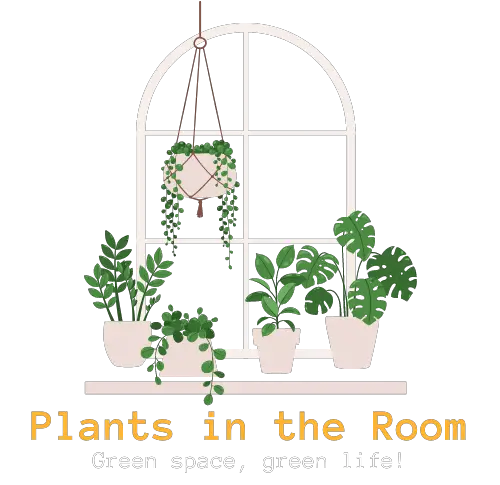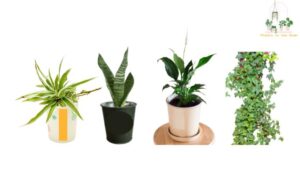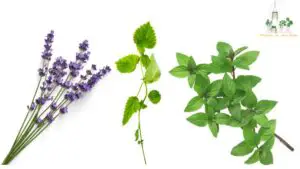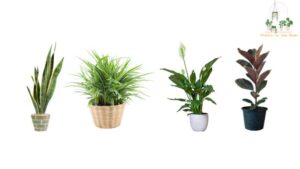This article covers the following areas –
Many people may not be aware of it, but our natural surroundings, including plants, have profound effects on our mental and physical health. Studies have shown that indoor plants, besides their aesthetic appeal, can also play a role in improving memory and concentration. In this article, I’ll talk about how indoor plants can enhance your memory and which ones are particularly effective.
Indoor plants like Rosemary, Snake Plant, Boston Ferns, Aloe Vera, and Peppermint enhance memory and cognitive function by purifying air, reducing stress, and improving mood. They absorb toxins, increase oxygen supply, and provide calming and mood-enhancing effects.
In the following sections of this article, we will delve into the science behind how indoor plants improve memory. We’ll also explore how the purification of air, stress reduction, and mood elevation each contribute to cognitive enhancement.
I’ll also provide a detailed look at some specific indoor plants highlighting how each plant can aid in improving memory and overall brain function. I believe I’ll be able to give you a comprehensive understanding of how you can harness the power of these plants to create a healthier and more productive living or working environment. So, keep reading.
How Do Plants Improve Memory?
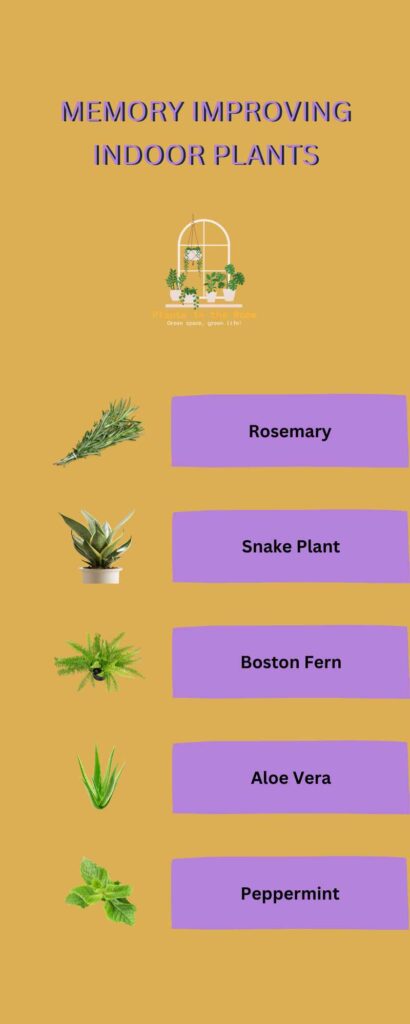
Our green friends have a range of positive impacts on human cognitive abilities. This is not just a mere coincidence but a result of various factors. From air purification and stress reduction to mood elevation, indoor plants can influence our brain function in many ways. Let’s take a closer look at each of these mechanisms.
A. The Role of Air Purification
Plants are incredible when it comes to air purification. They function as natural air filters, taking in carbon dioxide and other harmful toxins and releasing fresh oxygen into the environment through a process called photosynthesis.
(a) Supply Oxygen for Better Brain Function
An oxygen-rich environment is highly beneficial for brain function. Oxygen is crucial for the brain to produce energy and transmit signals between neurons, processes that are key to memory and learning. An oxygen supply increase can lead to better concentration, improved recall abilities, and overall enhanced cognitive performance.
(b) Remove Harmful Toxins
Plants also help by absorbing harmful indoor air pollutants such as formaldehyde, benzene, and trichloroethylene. These toxins, found in many common household items, can negatively affect cognitive abilities, leading to problems such as memory loss and lack of concentration. By reducing these pollutants, indoor plants can create a healthier and more brain-friendly environment.
B. Stress Reduction and Its Impact on Memory
It’s well-established that prolonged stress can have detrimental effects on memory. Cortisol, a hormone released during stressful situations, can interfere with learning and memory. With their calming presence, plants can play a role in mitigating stress.
(a) Lower Cortisol Levels
Studies suggest that interacting with indoor plants, such as watering or pruning them, can help lower cortisol levels. This reduction in stress hormones can lead to a clearer mind, enabling better focus and memory retention.
(b) Create the Nature More Soothing
In addition, the simple act of being around greenery can evoke a sense of tranquility, often associated with natural environments. This soothing effect can reduce mental fatigue, promoting a better mental state for learning and memory retention.
C. Mood Elevation and Cognitive Performance
Indoor plants can also make us happier, and a positive mood has been linked to better cognitive function.
(a) Boost Mood and Promote Feelings
Research has shown that being around plants and nature can boost mood and promote feelings of joy. Positive emotions can stimulate the release of dopamine in the brain, a neurotransmitter that plays a crucial role in learning and memory.
(b) Improve Creativity and Focus
Besides enhancing memory, a positive mood can also boost creativity and focus, further contributing to cognitive performance. Having indoor plants in our surroundings can offer these benefits, making them more than just decorative elements in our homes and offices.
5 Indoor Plants Those Help Boost Memory
We already learned that indoor plants can positively influence our cognitive abilities in several ways. They cleanse the air we breathe, remove harmful toxins, and foster a more oxygen-rich environment, leading to better brain function.
They also help reduce stress and anxiety and improve our mood, creating the perfect conditions for improved memory and enhanced concentration. Five particularly notable plants in this regard are rosemary, snake plant, Boston fern, aloe vera, and peppermint, each boasting unique qualities that make them beneficial for cognitive performance.
1. Rosemary

Long celebrated in literature for its memory-boosting qualities – Shakespeare’s Hamlet immortalized the phrase, “Rosemary for remembrance” – scientific studies have now caught up with this long-standing belief. The scent of rosemary has indeed been found to improve memory and increase alertness.
Keeping a rosemary plant in your study or work area might be just what you need for that extra productivity boost. Apart from its aromatic influence, interacting with a rosemary plant, like any plant, can induce a sense of calm.
The act of nurturing it can help lower stress levels, creating an environment that is more conducive to learning and concentration.
2. Snake Plant

The snake plant, also known as mother-in-law’s tongue, is an excellent choice for an indoor plant that supports cognitive function. Its striking appearance and ability to purify the air and release oxygen at night make it an ideal plant to place in your bedroom.
Snake plants are adept at absorbing toxins such as formaldehyde and benzene, thereby creating a healthier and more brain-friendly environment. What sets the snake plant apart is that, unlike most other plants, it produces oxygen even at night.
This ability can improve air quality as you sleep, and we all know that good sleep is crucial for memory consolidation and cognitive function. Moreover, it’s a low-maintenance plant that can thrive in various light conditions, making it easy to care for and a great addition to any room.
3. Boston Ferns

Boston Ferns are more than just a classic houseplant. They are recognized for their air-purifying properties, and their ability to improve indoor air quality can indirectly contribute to better brain function. Their lush, feathery fronds are not only visually pleasing but can also aid in removing harmful toxins from the air. By doing so, they create an environment that is more conducive to cognitive performance.
The simple act of nurturing a Boston Fern can also be beneficial. Taking care of plants has been shown to lower stress levels and promote relaxation, which can be instrumental in maintaining a clear mind and improving memory. If you are looking for a plant that adds elegance to your home decor while also supporting your cognitive health, a Boston Fern might just be what you need.
4. Aloe Vera
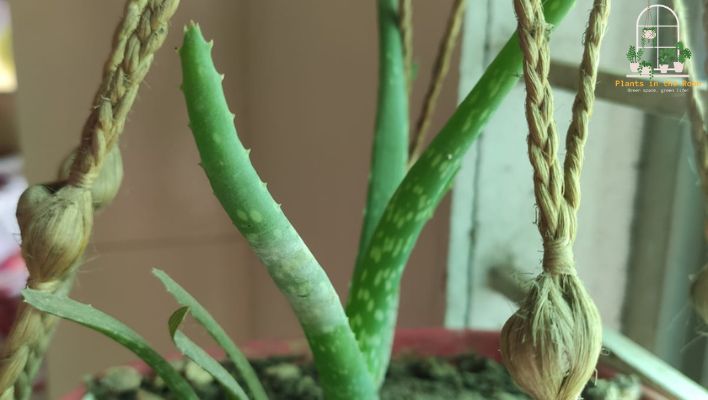
Aloe Vera, while well-known for its health benefits, particularly for skin and digestion, is also an excellent indoor plant for air purification. This succulent releases oxygen during the night, which can significantly improve the quality of the air in your sleeping environment.
Having an oxygen-rich atmosphere while you sleep can lead to better sleep quality. Good sleep is essential for memory consolidation, as it’s the time when the brain processes and stores new information. By helping to foster a better sleeping environment, Aloe Vera can indirectly contribute to improved memory and cognitive performance.
On top of its cognitive benefits, Aloe Vera is easy to care for and requires minimal watering, making it a great choice even for those new to plant care.
5. Peppermint
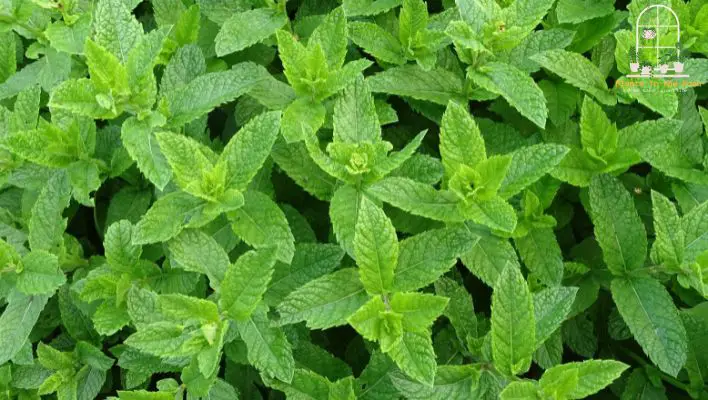
Peppermint is another plant that holds promise for cognitive enhancement. The refreshing and invigorating scent of peppermint has been suggested by studies to enhance memory and increase alertness. This is because our olfactory system – the part of our sensory system involved in smell – is closely linked with the parts of the brain that process memory and emotion.
Keeping a peppermint plant on your desk or in your study area can provide a constant source of its beneficial scent. As you go about your tasks, the aroma can help you maintain focus, making it easier to remember and process information. Additionally, the act of caring for the peppermint plant can have calming effects, further contributing to a more productive and memory-friendly environment.
In Conclusion
Indoor plants not only brighten up our spaces and purify the air, but they can also assist in improving memory and concentration. By integrating indoor plants like rosemary, snake plant, Boston fern, aloe vera, and peppermint into your home or office, you could experience these cognitive benefits for yourself.
However, remember that while these plants may contribute to enhancing cognitive functions, they are not a definitive solution for severe memory issues, which should always be discussed with a medical professional.
